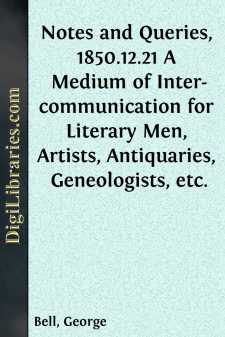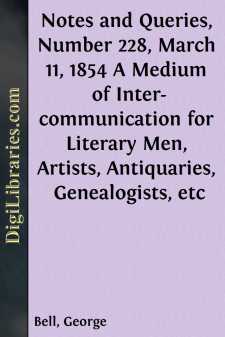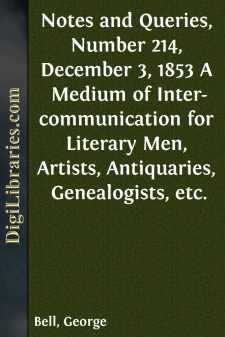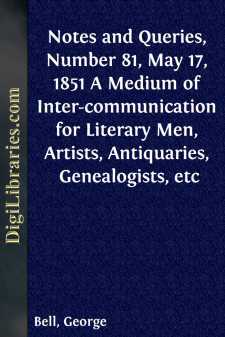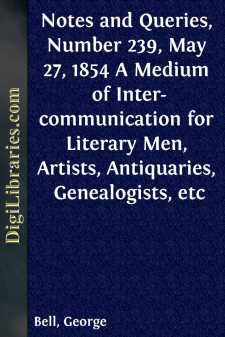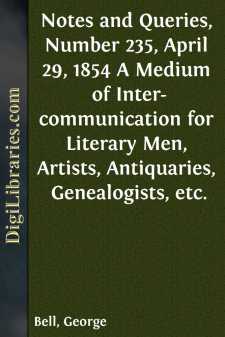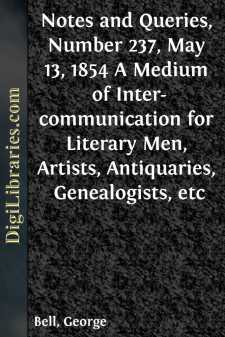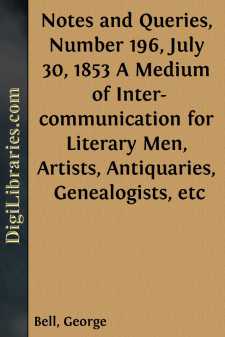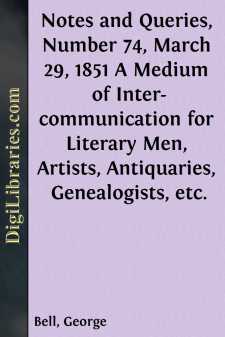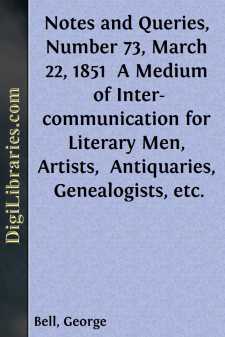Categories
- Antiques & Collectibles 13
- Architecture 36
- Art 48
- Bibles 22
- Biography & Autobiography 813
- Body, Mind & Spirit 142
- Business & Economics 28
- Children's Books 15
- Children's Fiction 12
- Computers 4
- Cooking 94
- Crafts & Hobbies 4
- Drama 346
- Education 46
- Family & Relationships 57
- Fiction 11829
- Games 19
- Gardening 17
- Health & Fitness 34
- History 1377
- House & Home 1
- Humor 147
- Juvenile Fiction 1873
- Juvenile Nonfiction 202
- Language Arts & Disciplines 88
- Law 16
- Literary Collections 686
- Literary Criticism 179
- Mathematics 13
- Medical 41
- Music 40
- Nature 179
- Non-Classifiable 1768
- Performing Arts 7
- Periodicals 1453
- Philosophy 64
- Photography 2
- Poetry 896
- Political Science 203
- Psychology 42
- Reference 154
- Religion 513
- Science 126
- Self-Help 84
- Social Science 81
- Sports & Recreation 34
- Study Aids 3
- Technology & Engineering 59
- Transportation 23
- Travel 463
- True Crime 29
Notes and Queries, 1850.12.21 A Medium of Inter-communication for Literary Men, Artists, Antiquaries, Geneologists, etc.
by: George Bell
Categories:
Description:
Excerpt
DIVISION OF INTELLECTUAL LABOUR.
Every one confesses, I believe, the correctness of the principle called "Division of labour." But if any one would form an adequate estimate of the ratio of the effect produced, in this way, to the labour which is expended, let him consult Dr. Adam Smith. I think he states, as an example, that a single labourer cannot make more than ten pins in a day; but if eight labourers are employed, and each of them performs one of the eight separate processes requisite to the formation of a pin, there will not merely be eight times the number of pins formed in a day, but nearly eighty times the number. (Not having the book by me, I cannot be certain of the exact statistics.)
If this principle is proved, then, to be of such extraordinary utility, why should it not be made serviceable in other matters besides the "beaver-like" propensity of amassing wealth and satisfying our material desires? Why should not your periodical be instrumental in transferring this invaluable principle to the labours of the intellectual world? If your correspondents were to send you abstracts or précis of the books which they read, would there not accrue a fourfold benefit? viz.:
1. A division of intellectual labour; so that the amount of knowledge available to each person is multiplied in an increasing ratio.
2. Knowledge is thus presented in so condensed a form as to be more easily comprehended at a glance; so that your readers can with greater facility construct or understand the theories deducible from the whole circle of human knowledge.
3. Authors and inquiring men could tell, before expending days on the perusal of large volumes, whether the particulars which these books contain would be suitable to the object they have in view.
4. The unfair criticisms which are made, and the erroneous notions diffused by interested reviewers, would in a great measure be corrected, in the minds, at least, of your readers.
You might object that such précis would be as partial as the reviews of which the whole literary world complain. But, in the first place, these abstracts would be written by literary men who are not dependent on booksellers for their livelihood, and would not therefore be likely to write up trashy books or detract from the merit of valuable works, for the sake of the book trade. And besides, your correspondents give their articles under their signature, so that one could be openly corrected by another who had read the same work. Again, it is only the leading idea of the book which you would require, and no attendant praise or blame, neither eulogistic exordium nor useless appeals to the reader. The author, moreover, might send you the skeleton of his own book, and you would of course give this the prior place in your journal.
Another objection is, that the length of such précis would not permit them to come within the limits of your work. But they should not be long. And even if one of them should take up four or five pages, you could divide it between two or three successive numbers of your periodical....


